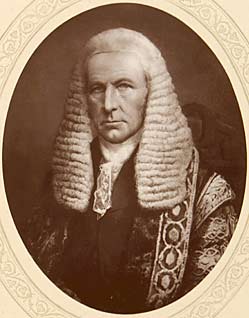Speaker Denison's Rule on:
[Wikipedia]
[Google]
[Amazon]
 Speaker Denison's rule is a constitutional convention established by John Evelyn Denison, who was Speaker of the British House of Commons from 1857 to 1872, regarding how the Speaker decides on their casting vote in the event of a tie in the number of votes cast in a division.
In 1867, when a tie arose on a motion on Fellowships at
Speaker Denison's rule is a constitutional convention established by John Evelyn Denison, who was Speaker of the British House of Commons from 1857 to 1872, regarding how the Speaker decides on their casting vote in the event of a tie in the number of votes cast in a division.
In 1867, when a tie arose on a motion on Fellowships at
List of all votes decided by the Speaker's casting vote since 1801
Constitution of the United Kingdom House of Commons of the United Kingdom Westminster system
 Speaker Denison's rule is a constitutional convention established by John Evelyn Denison, who was Speaker of the British House of Commons from 1857 to 1872, regarding how the Speaker decides on their casting vote in the event of a tie in the number of votes cast in a division.
In 1867, when a tie arose on a motion on Fellowships at
Speaker Denison's rule is a constitutional convention established by John Evelyn Denison, who was Speaker of the British House of Commons from 1857 to 1872, regarding how the Speaker decides on their casting vote in the event of a tie in the number of votes cast in a division.
In 1867, when a tie arose on a motion on Fellowships at Trinity College, Dublin
Trinity College Dublin (), officially titled The College of the Holy and Undivided Trinity of Queen Elizabeth near Dublin, and legally incorporated as Trinity College, the University of Dublin (TCD), is the sole constituent college of the Univ ...
, Denison gave his casting vote against the motion, declaring that any decision must be approved by the majority. The rule as subsequently adopted is that the Speaker, in any division upon a bill, should vote to leave a bill in its existing form.
The principle is always to vote in favour of further debate, or, where it has been previously decided to have no further debate or in some specific instances, to vote in favour of the status quo
is a Latin phrase meaning the existing state of affairs, particularly with regard to social, economic, legal, environmental, political, religious, scientific or military issues. In the sociological sense, the ''status quo'' refers to the curren ...
. Thus, the Speaker will vote:
* against the final reading
Reading is the process of taking in the sense or meaning of symbols, often specifically those of a written language, by means of Visual perception, sight or Somatosensory system, touch.
For educators and researchers, reading is a multifacete ...
of a bill (and against holding such readings immediately rather than in the future, to allow for time to consider the matter)
* in favour of earlier readings of bills (and in favour of holding such readings immediately rather than in the future, to allow for further debate)
* against amendments to bills
* against motions of no confidence
* in favour of disagreeing with amendments made by the House of Lords
The House of Lords is the upper house of the Parliament of the United Kingdom. Like the lower house, the House of Commons of the United Kingdom, House of Commons, it meets in the Palace of Westminster in London, England. One of the oldest ext ...
The thinking behind the rule is that change should only occur if an actual majority vote is in favour of the change.
Speaker Denison's rule is now a guiding principle in many other bodies that have neutral chairpersons.
Tied votes in the British House of Commons
In the case of a Committee of the Whole House, the presiding officer is the Chairman of Ways and Means or a Deputy Chairman. In other cases ofplenary session
A plenary session or plenum is a session of a conference or deliberative assembly in which all parties or members are present. Such a session may include a broad range of content, from keynotes to panel discussions, and is not necessarily r ...
, the presiding officer is the Speaker or a Deputy Speaker. Votes of smaller Commons committees are not listed.
Notes
References
{{reflist, 30emExternal links
List of all votes decided by the Speaker's casting vote since 1801
Constitution of the United Kingdom House of Commons of the United Kingdom Westminster system